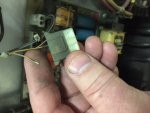If you use a butt connector and solder it or crimp it, that's just the mechanical attachment aspect. The water getting in is a completely different aspect and wire will corrode whether you use solder or crimp. Water travels under the insulation and travels down the wire. The corrosion aspect is how you seal the connection...not if you solder or crimp.
True...however, a soldered connection will far outlive a mechanical crimp in the same conditions..either one will still allow moisture to wick up the wire.
you wanna get real crazy you can remove the colored insulation on the lug and solder the crimp on the wire and seal it with epoxy shrink tube.
Did that on a product here at work that was exposed to some real damp conditions...worked out well.




















